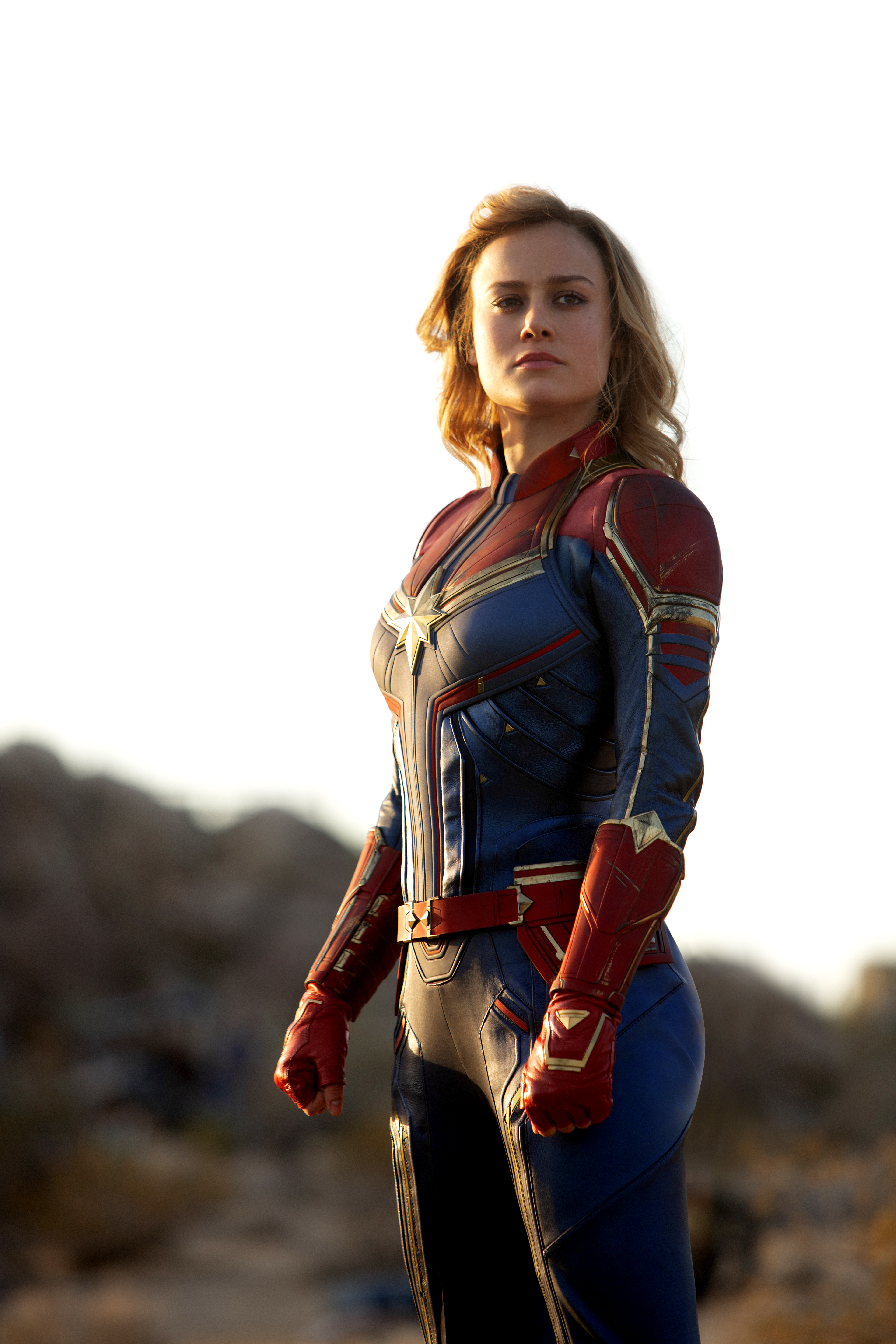How a little secrecy gives Captain Marvel a stronger story
Captain Marvel doesn't have much of a pre-superhero backstory. Good.


A free daily email with the biggest news stories of the day – and the best features from TheWeek.com
You are now subscribed
Your newsletter sign-up was successful
Captain Marvel is the 21st Marvel Studios superhero (or superhero-adjacent) movie in 11 years, but the first Marvel flick to center solely on a female champion.
It's also the first to employ a female director in Anna Boden, who co-directs with her partner, Ryan Fleck. This is all so pitifully overdue that even celebrating it feels a little like participating in the Marvel marketing machine: Is it great to see Brie Larson take center stage as a powerful lady superhero? Yes. Is it mind-boggling this hasn't happened already, after 20 prior films in this series? Also yes.
What really stands out about Captain Marvel, then, is its approach to its hero's origin. Unlike Marvel's typically heavy-handed exposition, this movie only hints at a backstory it never truly reveals. The restraint is refreshing.
The Week
Escape your echo chamber. Get the facts behind the news, plus analysis from multiple perspectives.

Sign up for The Week's Free Newsletters
From our morning news briefing to a weekly Good News Newsletter, get the best of The Week delivered directly to your inbox.
From our morning news briefing to a weekly Good News Newsletter, get the best of The Week delivered directly to your inbox.
Captain Marvel begins with an alien soldier named Vers (Larson), training with her mentor (Jude Law) and going on missions with her fellow Kree (blue-blooded, fiercely powerful warriors who are otherwise humanoid). When she's captured by Talos (Ben Mendelsohn), a leader of the Kree's shapeshifting enemies the Skrulls, he pokes around in her brain, and the movie reveals bits and smears of her memories, bleeding into each other and repeatedly rewound and refocused to extract crucial information. She finally escapes to the "shithole" planet (wink, wink) we know as Earth.
Eventually, as superhero fans or even trailer-watchers will already know, we learn that this alien soldier was once a human pilot named Carol Danvers whose body has been infused with Kree powers. But this isn't just an origin story told out of order: It's structured so we never get a long, lingering look at Danvers in her wholly human, pre-Kree form. It's just those memory fragments, poking through with clever edits. The full extent of her human life remains largely private.
As the Marvel movies have grown more insular, even the good ones aren't immune to certain storytelling tics. One especially popular technique is cold-opening the movie with a flashback either to the villain as a young man or to familiar characters magically de-aged to offer some sort of universe-strengthening backstory. Captain Marvel features the most significant such de-aging of any Marvel picture so far; Samuel L. Jackson is basically the film's second lead, and to play SHIELD's Nick Fury in his pre-Avengers days, he's been made to look about 25 years younger.
Still, some tedious nods to Marvel continuity aside, Danvers isn't defined by how or whether she interacted with the larger Marvel Cinematic Universe (MCU) as a human being. In a way, it's disappointing not to see Larson, a wonderfully expressive actress, getting to inhabit more "normal" scenes, which could have given her more time with her underdeveloped best friend, Maria (Lashana Lynch). What the movie sacrifices in hangout time, however, it gains in the unusual sight of a female superhero figuring herself out without squeezing her backstory into Marvel's backstory. Though we don't see much of "regular" Carol, there's a sense her humanity exists outside of MCU purview.
A free daily email with the biggest news stories of the day – and the best features from TheWeek.com
That's bolstered by the movie's 1995 setting. While its period details are often generic, they root the movie at a spot in the MCU timeline relatively unencumbered by superheroics. This is no small feat considering how much of the past has been colonized with SHIELD history — like what Iron Man's dad or the Wasp's mom or Captain America's colleagues were up to years before any of the primary superheroes met.
These historical details hint at a larger fantastical world, but they can also make the MCU feel paradoxically smaller. The 1995 of Captain Marvel may be primarily a collection of alt-rock soundtrack cues and jokes about slow dial-up internet, but for audience members of a certain age (old enough to have experienced the '90s, but young enough to be a little hazy on the details), it will feel something like real life.
The strategy isn't entirely effective, and Captain Marvel is still largely formulaic by design. The quips often feel surgically added by a script doctor. The action sequences are generally obligatory and rarely inventive, save some stray bits related to how Captain Marvel uses her powers.
It would be thrilling if the MCU allowed filmmakers like Anna Boden and Ryan Fleck, who made the wonderful Mississippi Grind and Sugar, to impose a different visual style on more of the material than Carol's memory glimmer, but for whatever reason they haven't been afforded the same leeway as Ryan Coogler (Black Panther) or Taika Waititi (Thor: Ragnarok). Though there are a few moments in the far-off planets scenes when Captain Marvel uses a warmer, richer color scheme, there's no effort made to give Earth in 1995 a different texture than any other lower-tier Marvel picture set in the present day.
But real differences in texture come from what's not on screen. In a cinematic universe as encompassing as Marvel's, that absence is a welcome addition.
Jesse Hassenger's film and culture criticism has appeared in The Onion's A.V. Club, Brooklyn Magazine, and Men's Journal online, among others. He lives in Brooklyn, where he also writes fiction, edits textbooks, and helps run SportsAlcohol.com, a pop culture blog and podcast.
-
 The Gallivant: style and charm steps from Camber Sands
The Gallivant: style and charm steps from Camber SandsThe Week Recommends Nestled behind the dunes, this luxury hotel is a great place to hunker down and get cosy
-
 The President’s Cake: ‘sweet tragedy’ about a little girl on a baking mission in Iraq
The President’s Cake: ‘sweet tragedy’ about a little girl on a baking mission in IraqThe Week Recommends Charming debut from Hasan Hadi is filled with ‘vivid characters’
-
 Kia EV4: a ‘terrifically comfy’ electric car
Kia EV4: a ‘terrifically comfy’ electric carThe Week Recommends The family-friendly vehicle has ‘plush seats’ and generous space
-
 Walter Isaacson's 'Elon Musk' can 'scarcely contain its subject'
Walter Isaacson's 'Elon Musk' can 'scarcely contain its subject'The latest biography on the elusive tech mogul is causing a stir among critics
-
 Welcome to the new TheWeek.com!
Welcome to the new TheWeek.com!The Explainer Please allow us to reintroduce ourselves
-
 The Oscars finale was a heartless disaster
The Oscars finale was a heartless disasterThe Explainer A calculated attempt at emotional manipulation goes very wrong
-
 Most awkward awards show ever?
Most awkward awards show ever?The Explainer The best, worst, and most shocking moments from a chaotic Golden Globes
-
 The possible silver lining to the Warner Bros. deal
The possible silver lining to the Warner Bros. dealThe Explainer Could what's terrible for theaters be good for creators?
-
 Jeffrey Wright is the new 'narrator voice'
Jeffrey Wright is the new 'narrator voice'The Explainer Move over, Sam Elliott and Morgan Freeman
-
 This week's literary events are the biggest award shows of 2020
This week's literary events are the biggest award shows of 2020feature So long, Oscar. Hello, Booker.
-
 What She Dies Tomorrow can teach us about our unshakable obsession with mortality
What She Dies Tomorrow can teach us about our unshakable obsession with mortalityThe Explainer This film isn't about the pandemic. But it can help viewers confront their fears about death.
